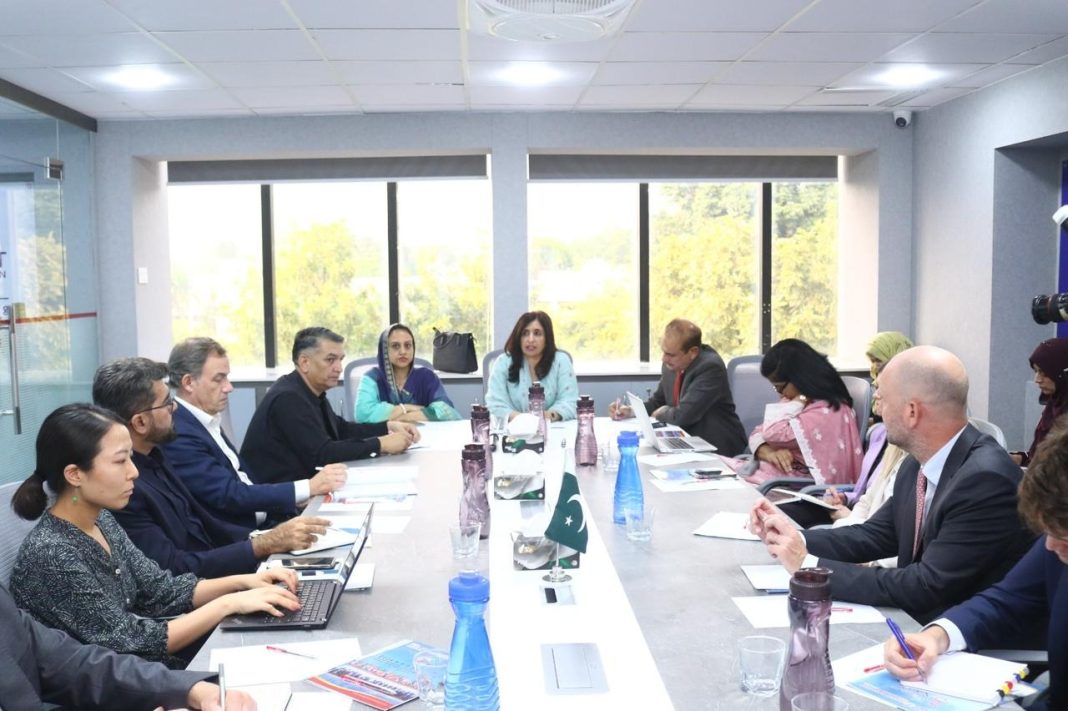Islamabad: 23rd Shanghai Cooperation Organization (SCO) Council of Heads of Government Meeting held in Islamabad has offered Pakistan a unique opportunity to further enhance regional connectivity options and promote trade and economic ties apart from security and strategic cooperation within the SCO. SCO, as an organization with its unique geopolitical and geostrategic significance, has evolved over the years and shifted its focus towards geo-economics.
SCO continues to serve as a platform for fostering regional peace and stability through economic col-laboration and security initiatives. Pakistan’s strategic role within the SCO, opportunities for enhanced trade, infrastructure development, and multilateral security cooperation has increased manifold.
SCO’s focus on regional integration, financial independence, and sustainable development is crucial for ensuring lasting peace and prosperity in the region. These were the remarks by the speakers speaking at the roundtable discussion titled “Post-SCO Council of Heads of Government Meeting 2024: Unpack-ing the Results and Opportunities” organized by Centre for SCO Studies at the Institute of Peace and Diplomatic Studies, Pakistan-SCO Friendship Forum and the Riphah Institute of Public Policy, Riphah International University regarding the outcomes of the 23rd SCO Council of Heads of Government Meeting, held in Islamabad on October 15-16, 2024.
Dr. Farhat Asif, President of the Institute of Peace and Diplomatic Studies, in her opening remarks, highlighted the importance of evaluating the strategic and economic impacts of the recent SCO meet-ing held. She emphasised that the SCO summit had reinforced the importance of fostering multilateral cooperation across diverse sectors such as security, trade, and sustainable development. Ms. Mumtaz Zahra Baloch, Spokesperson Ministry of Foreign Affairs of Pakistan, in her keynote address, shared the key highlights of the SCO Council of Heads of Government Meeting 2024 and key outcomes of the dis-cussion.
She said that next year, Pakistan will be heading the Regional Antiterrorism Structures (RATS) body in SCO, and the following year, Pakistan will be chairing the SCO Council of Heads of State in 2026 and will host a similar summit then.
She added that hosting such a high-level summit has bolstered Pakistan’s image globally. While speaking on the occasion, Dr. Talat Shabbir, Director of the China-Pakistan Study Centre at the Institute of Strategic Studies Islamabad (ISSI), highlighted the economic and strategic benefits that Pakistan can derive from the SCO, especially in terms of security cooperation and eco-nomic collaboration.
Prof. Dr. Shabbir emphasized that economic stability and security go hand in hand, and Pakistan’s growing involvement in the SCO strengthens both aspects. Dr. Sarwat Rauf, Head of the Department of International Relations at the National University of Modern Languages (NUML), spoke on the po-tential for enhanced trade and economic connectivity between Central Asia and South Asia.
Dr. Sarwat underscored the importance of Pakistan’s role in facilitating regional security dialogues, par-ticularly in addressing terrorism and extremism. Dr. Muhammad Munir, Dean of Social Sciences at MY University, presented a detailed analysis of the key takeaways from the summit.
He shed light on Paki-stan’s pivotal role as host, which showcased its diplomatic leadership in fostering regional cooperation. Dr. Munir also highlighted various regional projects that are progressing in building regional peace and cooperation, including Belt and Road Initiative (BRI) and CPEC apart from various others.
Dr. Rashid Aftab, Director of the Riphah Institute of Public Policy, concluded the session by discussing the future prospects for Pakistan within the SCO framework. He highlighted that the summit’s focus on sustainable development, climate action, and renewable energy aligns with Pakistan’s national de-velopment priorities.
Dr. Aftab reiterated the need for increased academic and policy-oriented collaboration between SCO member states to address common challenges and maximise mutual benefits. The event was attend-ed by diplomats, academics and students and members of civil society, including media. –PR



